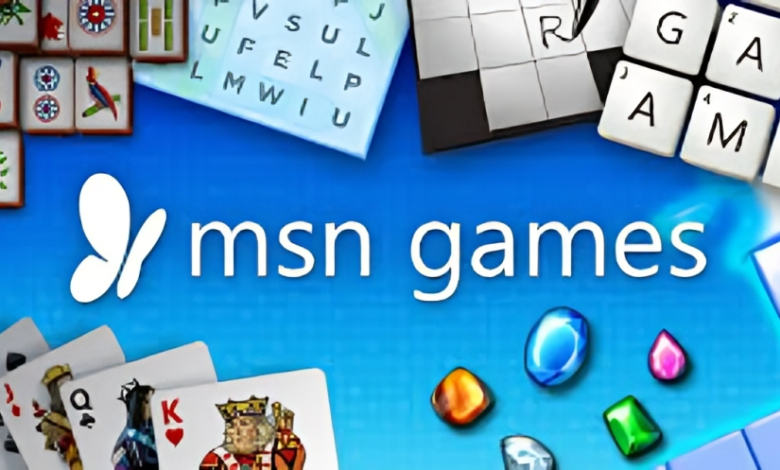MSN Games A Journey Through Gaming Nostalgia and Modern Entertainment

The internet has drastically transformed the way we play games over the past few decades, from simple browser-based games to complex multi-player experiences. One of the earliest platforms that introduced millions to the joys of online gaming was MSN Games. With its collection of casual and engaging games, MSN Games became a household name, providing players with everything from Solitaire to chess and trivia. Today, MSN Games holds a special place in gaming history, evolving from a simple online gaming portal to an integrated hub offering a variety of gaming experiences.
In this article, we’ll explore MSN Games, its origins, its rise to fame, and how it continues to provide entertainment to gamers around the world.
The Beginning of MSN Games
MSN Games was launched by Microsoft in 1996 as a part of the MSN (Microsoft Network) portal. At the time, online gaming was still in its infancy, and casual gaming—games that were easy to pick up and play for short sessions—had not yet become a mainstream phenomenon. Microsoft saw an opportunity to offer free online games to its users as a way to drive traffic to its services and keep users engaged.
The platform started by offering simple games like Solitaire, Minesweeper, and FreeCell—games that were already popular on Microsoft Windows. These were classic solo games that people could play without the need for an internet connection. However, MSN Games quickly expanded to include a variety of multiplayer games as well, including card games, board games, and word games. This expansion made MSN Games one of the go-to platforms for casual gamers looking to pass the time.
The Rise to Popularity
Throughout the late 1990s and early 2000s, MSN Games saw an explosive increase in users. The platform’s easy-to-navigate interface and wide range of games made it accessible for people of all ages and backgrounds. MSN Games offered a sense of community for its players, with features like online leaderboards, chat functions, and the ability to compete against friends or strangers from around the world.
One of the most notable features of MSN Games was its multiplayer functionality. Games like Hearts, Spades, and Chess allowed players to challenge one another in real-time, making the experience more engaging and competitive. MSN also incorporated social aspects into the platform, such as allowing players to create profiles, add friends, and interact through private messages or public chats. These elements set MSN Games apart from other gaming platforms of the time and helped establish it as one of the pioneers of online gaming communities.
Additionally, MSN Games benefitted from being tied to the Microsoft ecosystem. As Windows became one of the most widely used operating systems in the world, MSN Games’s had a natural advantage in reaching a massive audience. By being pre-installed on millions of PCs, the platform had instant access to a large pool of potential players, which allowed it to flourish.
The Evolution of MSN Games
By the mid-2000s, MSN Games’s had cemented itself as a beloved part of the internet’s early gaming history. However, the gaming landscape was rapidly changing. Social media platforms were growing in popularity, and mobile gaming was on the rise. To adapt to these trends, Microsoft began to update MSN Games, focusing more on online multiplayer experiences and adding more modern titles.
One significant change came with the introduction of MSN Messenger (later rebranded as Windows Live Messenger), which allowed users to play games with their contacts directly through the messaging app. This integration created an even stronger sense of community and made MSN Games’s more accessible to people who were already using Messenger for chatting with friends. The ability to challenge a friend to a game or share scores made MSN Games’s even more social and interactive.
During this time, new genres of games were added to the platform, including puzzle games, sports games, and action-oriented titles. These updates helped keep MSN Games relevant and appealing to a broader audience. Games like Bejeweled, Mahjong, and PopCap became household names, with many players returning to the platform regularly to play their favorites.
Transition to Xbox Live Arcade and Other Microsoft Platforms
As technology advanced, MSN Games had to evolve once again. By the time Microsoft launched the Xbox 360 in 2005, the company’s focus had shifted toward more complex gaming systems, including consoles, as well as the expanding world of mobile and online gaming. MSN Games was gradually incorporated into Microsoft’s larger ecosystem of gaming platforms, including Xbox Live Arcade.
The games that once lived exclusively on MSN Games started to migrate to Xbox Live Arcade, which allowed players to download games directly to their consoles. This marked the transition from browser-based casual games to downloadable and more immersive gaming experiences. Some of the most iconic games from MSN Games were re-released on Xbox Live Arcade, allowing gamers to enjoy them on their gaming consoles.
As part of Microsoft’s broader gaming strategy, MSN Games also made its way onto mobile platforms. With the rise of smartphones, Microsoft adapted its games for mobile devices, including Windows Phone, iOS, and Android. This expansion allowed Microsoft to capture the growing mobile gaming market and attract new players who might not have been interested in traditional desktop or console gaming.
MSN Games Today: A Continued Legacy
While MSN Games’s is no longer as prominent as it once was, its legacy continues to influence modern online gaming. Many of the popular games that MSN Games’s featured have evolved or migrated to other platforms, and the casual gaming genre has continued to grow in popularity. Titles like Solitaire, Minesweeper, and Chess have become available on almost every platform imaginable, from smartphones to gaming consoles, proving that these simple games still have a special place in people’s hearts.
In recent years, MSN Games’s has been rebranded and integrated into the Microsoft Store, which offers a variety of casual and more advanced gaming experiences. Microsoft’s focus on more immersive and expansive titles, especially through its Xbox and PC gaming platforms, has pushed MSN Games’s into the background. However, the influence of MSN Games’s can still be seen in the numerous casual games available across multiple platforms today.
Moreover, the emphasis on social and multiplayer features in modern online games can trace its roots back to the early days of MSN Games’s. The idea of connecting with friends and playing games together laid the foundation for services like Xbox Live, Steam, and PlayStation Network, where social interaction plays a key role in the gaming experience.
What Made MSN Games’s Unique?
There were several factors that made MSN Games’s stand out during its peak:
- Accessibility: MSN Game’ss was free to use and accessible to anyone with an internet connection, making it one of the most user-friendly platforms available.
- Variety of Games: From card games like Solitaire and Hearts to action-packed puzzle games like Bejeweled, MSN Games’s offered something for everyone.
- Social Features: The platform’s integration with MSN Messenger and the ability to challenge friends or join multiplayer games created a sense of community.
- Low System Requirements: Since most games were browser-based, they required minimal hardware and were playable on even older computers.
- Regular Updates: MSN Games’s regularly added new games and features, which kept the platform fresh and exciting for returning players.
The Future of Casual Online Gaming
Casual online gaming, like the type that MSN Games’s popularized, is far from over. With the rise of social media platforms, mobile apps, and online multiplayer services, casual gaming has only become more mainstream. Companies like Zynga, King, and PopCap have continued to produce popular titles that appeal to a broad audience.
Furthermore, online platforms such as Facebook Gaming, Twitch, and YouTube Gaming continue to showcase the enduring appeal of casual games, even though the nature of online gaming has become more competitive and complex in recent years.
MSN Games’s may no longer be the dominant force it once was, but its influence on the world of casual gaming is undeniable. The platform not only introduced millions of people to the concept of online gaming, but it also helped shape the way social interaction is woven into the fabric of gaming today.
Conclusion
MSN Games may have started as a simple gaming portal for Windows users, but its impact on the world of online gaming is profound. The platform provided accessible, fun, and social experiences for millions of people, shaping the landscape of online gaming as we know it today. Though the platform has evolved and transformed into other Microsoft offerings, its legacy lives on in the millions of players who fondly remember the games they played on MSN. Whether it was a few rounds of Solitaire or a competitive chess match, MSN Games’s will always be a part of the early internet gaming era—a symbol of the simple pleasures of casual gaming.




